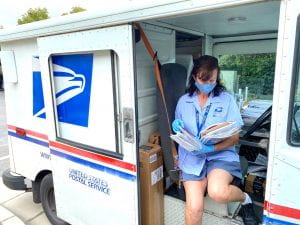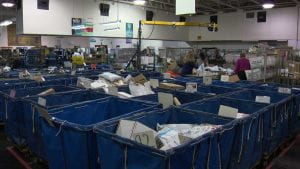At first glance, one might not think there are many businesses that are “life-sustaining,” as Pennsylvania Governor Tom Wolf put it back in March of 2020. Hospital personnel, gorcery store workers, and first responders are really the only obvious things most people think of when describing “eseential workers” in essential industries. However, it requires many more people across a multitiude of businesses, organizations and industries to keep the world spinning (so to speak), even in the middle of a pandemic. One of those groups are postal workers.
Specifically, employees of the United States Postal Service. While there are other physical delivery services such as UPS and FedEx, United States Postal Service workers stand out because they are employees of a government agency, which does not have the same capabilities of dealing with the unique challenges presented by a pandemic as private businesses do. Despite that, the postal service must keep operating no matter what.

There are several reasons for that. First, only the USPS has the necessary infrastructure to reach every corner of America, even the most rural of areas. It is not economically feasible for private companies to operate in extremely rural areas, but the postal service is obligated to serve all Americans, so it does. Furthermore, “the USPS is tasked with assisting in the distribution and transportation of medicine, pharmaceuticals, and medical information to the general public affected by a major disaster or emergency.” Factor in a raging pandemic that prevents many from leaving their own homes, and the USPS becomes all the more critical. In fact, it is more essential than ever.
Unfortunately, the USPS is unique as a government agency in that it does not receive taxpayer funding. Instead, it funds itself through postage and other products. That is why the mail still comes during a government shutdown. That doesn’t mean they turn a profit, though. The USPS, despite not receiving government funding, is still burdened by the many rules and regulations that affect federal agencies, and is even singled out by provisions in some regulatory legislation, creating even more burdens. As a result, they don’t turn a profit and, while still operating each and every day, do not have the same options and amenities readily availible when it comes to mitigating certain crises.
One such crisis is the COVID-19 pandemic. Postal workers have put their

life on the line from the start. Remember there was once a time when we thought COVID-19 might be able to be spread easily or primarily by touching items that had also been touched by an infected person. Some people still think that, which is why sanitizing commonly touched (and uncommonly tocuhed, for that matter) surfaces is now a mainstay in American businesses and homes. Yet postal workers still went to work every day and sorted and delivered the mail, touching items from an unimaginable number of sources unbeknownst to them. We just had to worry about our own mail. They had to worry about all of it. Moreover, it is important to remember that not every employee just drives the trucks or carries a bag of mail by themselves, both of ewhich easily allow for social distancing. Many USPS employees work in offices and warhouses sorting mail, loading and unloading trucks, and completing all the essential tasks as they prepare mail for transport and delivery. As one worker said when discussing him and his USPS coworkers ability to social distance, “It’s really hard. We try to do as much as we can. We still have a lot of people in one building, especially when we take our break, everybody needs to eat and they take off their mask.”
These people were unsung heroes even before the pandemic, providing an essential servide that most people could not live without while receiving little to no recognition. Their jobs have only gotten harder and more dangerous with the onset of the COVID-19 pandemic. Despite that, they continue to work and do their jobs to the best of their ability. They are patriots who deserve our thanks for constantly putting themselves in harm’s way for our sake. They are most definitely some of the many unsung heroes of the COVID-19 pandemic.